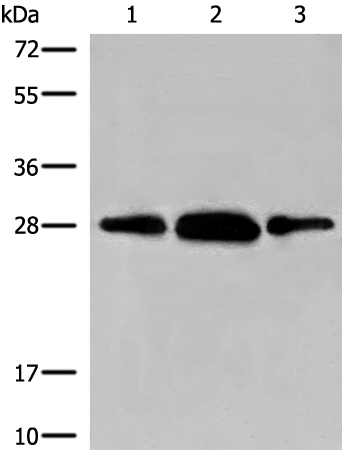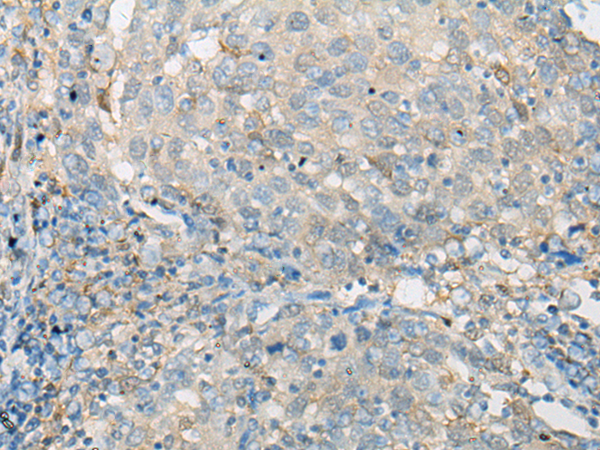

| WB | 咨询技术 | Human,Mouse,Rat |
| IF | 咨询技术 | Human,Mouse,Rat |
| IHC | 1/20-1/100 | Human,Mouse,Rat |
| ICC | 技术咨询 | Human,Mouse,Rat |
| FCM | 咨询技术 | Human,Mouse,Rat |
| Elisa | 1/5000-1/10000 | Human,Mouse,Rat |
| Aliases | SWS1 |
| WB Predicted band size | 27 kDa |
| Host/Isotype | Rabbit IgG |
| Antibody Type | Primary antibody |
| Storage | Store at 4°C short term. Aliquot and store at -20°C long term. Avoid freeze/thaw cycles. |
| Species Reactivity | Human, Mouse, Rat |
| Immunogen | Synthetic peptide of human EFHD2 |
| Formulation | Purified antibody in PBS with 0.05% sodium azide and 50% glycerol. |
+ +
以下是关于EFHD2抗体的3-4篇文献摘要概览:
---
1. **文献名称**:*EFHD2 promotes mitochondrial fragmentation and apoptosis in response to DNA damage*
**作者**:Sánchez-López et al. (2018)
**摘要**:该研究通过Western blot和免疫荧光技术,发现EFHD2蛋白在DNA损伤条件下通过结合BAX蛋白促进线粒体分裂及细胞色素c释放,从而激活细胞凋亡。研究使用EFHD2特异性抗体验证其表达水平及亚细胞定位。
2. **文献名称**:*EFHD2 modulates NLRP3 inflammasome activation by regulating ASC oligomerization*
**作者**:Chen et al. (2020)
**摘要**:本文利用CRISPR/Cas9敲除EFHD2的细胞模型及免疫共沉淀技术,证明EFHD2通过与ASC蛋白相互作用增强NLRP3炎症小体组装,促进IL-1β分泌。EFHD2抗体被用于检测炎症条件下的蛋白表达变化。
3. **文献名称**:*EFHD2 as a potential biomarker for ovarian cancer progression*
**作者**:Kim et al. (2019)
**摘要**:研究通过免疫组化分析发现,EFHD2在卵巢癌组织中高表达,且与患者生存率负相关。EFHD2抗体用于组织样本染色,揭示其可能通过调控上皮-间质转化(EMT)促进肿瘤转移。
4. **文献名称**:*Calcium-dependent conformational changes of EFHD2 regulate its binding to microtubules*
**作者**:Müller et al. (2016)
**摘要**:该文献利用EFHD2抗体进行免疫荧光定位,发现EFHD2的钙离子结合能力影响其与微管蛋白的结合,进而调节细胞骨架动态变化,提示其在神经元发育中的潜在作用。
---
以上研究均涉及EFHD2抗体的应用,涵盖凋亡、炎症、癌症及结构功能等领域,可作为相关实验的参考依据。
EFHD2 (EF-hand domain-containing protein 2), also known as Swiprosin-1. is a calcium-binding protein implicated in diverse cellular processes, including apoptosis, cytoskeletal organization, and immune regulation. It contains two EF-hand motifs that enable calcium-dependent interactions, modulating its activity in signaling pathways. EFHD2 is expressed in various tissues, with higher levels observed in the brain, immune cells, and testes. Studies highlight its role in neuronal function, particularly in regulating tau protein aggregation linked to Alzheimer’s disease, and in immune responses, where it influences B-cell and T-cell signaling, migration, and activation.
EFHD2 antibodies are essential tools for investigating its expression, localization, and molecular interactions. They are widely used in techniques like Western blotting, immunofluorescence, and immunoprecipitation to study EFHD2's involvement in diseases. For instance, research using these antibodies has revealed EFHD2's upregulation in neurodegenerative conditions and certain cancers, suggesting its potential as a biomarker or therapeutic target. Antibody specificity is often validated via knockout (KO) models or siRNA knockdown to ensure minimal cross-reactivity. Commercial EFHD2 antibodies are typically raised against conserved epitopes, allowing cross-reactivity in human, mouse, and rat samples. Recent work also explores EFHD2's mitochondrial role in apoptosis, underscoring the antibody's utility in dissecting context-dependent functions. Overall, EFHD2 antibodies remain critical for unraveling its physiological and pathological mechanisms.
×